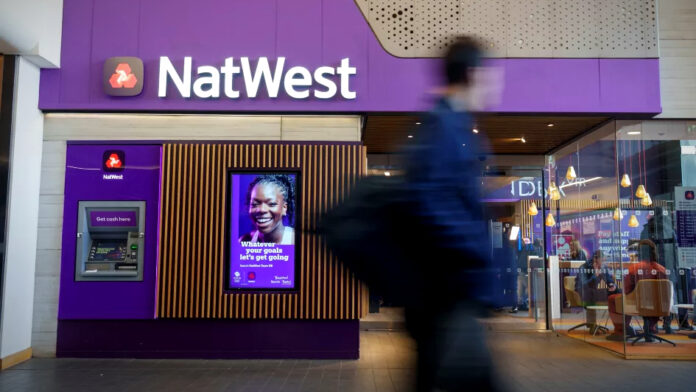NatWest has signed a five-year deal with AWS and Accenture to unify and modernise its data systems using AI, aiming to simplify operations, personalise services, and improve security and compliance.
In sum – what to know:
Architecture – AWS and Accenture will build a new AI cloud platform to simplify NatWest’s bank-wide operations.
Application – OpenAI partnership is delivering chatbot upgrades and AI-driven service, and higher satisfaction.
Customers – 80% of customers bank digitally; AI is already helping with fraud, onboarding, analytics, productivity.
British banking firm NatWest Group has signed a five-year deal with AWS and Accenture to clean and organise its data, and make it available in a single data platform in the cloud to run through AI analytics engines to streamline business operations, personalise customer services, and improve security checks and regulatory reporting. Training of banking staff in AI, and sundry digital matters, is covered, as well. There is no word on the value of the deal.
NatWest said it wants a “bank-wide data platform as part of a “bank-wide simplification”. The architectural angle is about the “consolidation of various data streams into a single bank-wide data platform”, it said. This platform will be “enabled by AI”, it added. It has turned to AWS and Accenture for “advanced cloud” and AI, as well as “banking expertise”. The latter aspect is presumably more about digital “expertise” relevant to financial services.
NatWest, with 20 million banking customers, claims it is already “exploring” 275 AI projects, and has around 25 AI use cases in production. It has been working on “bank-wide simplification” with US-based ‘frontier’ AI developer OpenAI since March, at least. It is the first UK-headquartered bank to work with OpenAI, it says. The remit is the same: to “deploy AI to meet customers’ needs faster and more effectively and to increase productivity and efficiency”.
It is using generative AI from OpenAI in its Cora+ and AskArchie+ service chatbots. It stated: “The generative AI functionality offered by Cora+ has shown a 150 percent improvement in customer satisfaction, while reducing the number of times a colleague needs to intervene.” In 2024, Cora handled 11.2 million retail customer conversations, according to the NatWest website; almost half (49 percent) required no human intervention.
Four in five (80 percent) of NatWest’s retail customers bank “entirely digitally”. Seven thousand customer service staff (it is unclear if this is all / some of them) are using AI to transcribe conversations and reduce time to search data. NatWest utilises AI, in some form, in about one in five (19 percent) of its analytical models. It has invested consistently, it implies, in “cloud data platforms, machine learning capabilities, and data specialist resources”.
The March deal gives NatWest “direct access” to OpenAI’s technology and insights, it said. NatWest will uphold “industry-leading data privacy guardrails”, it added. These include data encryption and anonymisation. It has listed seven ‘AI principles’ besides (see below), as part of an AI code of conduct, which says that all of its AI systems are “subject to human oversight”, and are “free from bias” and considerate of “social and environmental impacts”.
This last part addresses the great industrial tension with big tech, of course. It might be noted, the UK government has just signed with Open AI to invest in UK AI infrastructure and regional growth zones, and to deploy AI in areas such as justice, defence and security, and education. The move, announced earlier this week, has been met with calls for the government to provide greater transparency about what data OpenAI may be permitted to access.
For NatWest, its new five-year arrangement with AWS and Accenture appears to be more about how to redesign its digital operations to better leverage such tools, as provided by the likes of OpenAI, as well as these others. A press statement talks about “state-of-the-art data capabilities for relationship managers, [to equip] them with advanced tools… access and analyse deep insights for each customer”. Which is about co-pilots for service agents, again.
But it also talks about “seamless engagement and real time communication”, which is about how its systems talk to each other, and how data is carried – to enable “faster onboarding through digital verification and streamlined documentation processes”, for example. It wants “greater automation of processes and controls”, and “better quality data to support robust security and protection measures… [for] complaints handling and improved fraud prevention”.
It also wants “more agile capital management”, which sounds less like a retail banking initiative. There is a staff training programme attached, but not much is said of that. Paul Thwaite, chief executive at NatWest Group, said the plan is to be a “simpler, more technology and data-driven bank… [and] to quietly revolutionise how we serve our customers through the use of AI and other technologies.”
Julie Sweet, chair and chief executive at Accenture, commented: “NatWest has a bold vision to use the power of its data to seamlessly tie together its products, channels, and customer touchpoints – a major step forward in making banking easier for its customers and providing them with more personalised experiences… We will help NatWest raise the bar for how banks can use data and AI to better serve customers and reach new levels of performance.”
Matt Garman, chief executive at AWS, said: “NatWest is setting new standards in banking as a more agile, customer-focused bank. [Its] AI-enabled platform will deliver the agility, security, and reliability needed to deepen customer relationships and drive growth. This exemplifies how forward-thinking financial institutions work with AWS to solve real problems and innovate at scale.”

